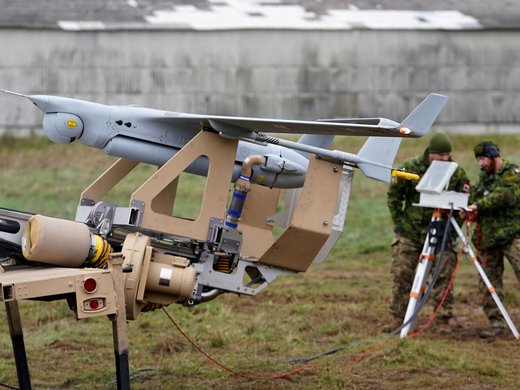The recent leak of a trove of US intelligence documents onto social media channels is weird, serious, and represents a new dimension of information insecurity in the digital age.
The weirdness is exemplified by information that emerged in the wake of a Washington Post investigation into the leaker — a young man who used the code name “OG” (Original Gangster) and who worked on a military base. CBS subsequently reported the leaker’s name as Jack Teixeira. The New York Times described Teixeira as a 21-year-old member of the intelligence wing of the Massachusetts Air National Guard. The Federal Bureau of Investigation announced on April 13 that a suspect in the leaks had been arrested at a residence in North Dighton, Massachusetts.
The leaker established a cult following on Discord, a chatroom popular with gamers, by providing a small band of followers, who hung out on a dedicated server, with excerpts from classified documents. According to The New York Times, the leaks had gone on for as long as three years before the material began bleeding out onto other social media channels, including Twitter and Telegram. The initial recipients of the leaks were thought to have numbered only about 25 (although it is reported that about half were non-Americans). Now the leaks are everywhere.
“OG” fits the classic profile of leakers laid down during the Cold War and known as M.I.C.E. In his case, he does not appear to have been driven by monetary gain, ideology, or some form of corruption, but purely by ego. He was out to impress his little band of gamers with his secret knowledge, and to bind them to him.
The leak is serious because of its current, and worse still, future impact, in the United States and abroad. As more material is uncovered in the corners of the internet — we may have only seen the tip of the iceberg — the impacts will only get worse.
The newness is informed by the leak’s uncontrolled spread through digital platforms and uncurated nature. The leak has no controlling agenda and seem to cover everything under the sun. Although many of the documents concern US and North Atlantic Treaty Organization (NATO) assistance to Ukraine, and American intelligence regarding the war, there is material that touches on South Korean arms supplies, China’s red lines, Türkiye, the United Arab Emirates, Israeli domestic politics, and no doubt much more.
There is a hierarchy of worry about the incident. At the top is the US intelligence system, desperate to contain the leak and understand its origins, all the while reassuring allies and keeping the massive American intelligence engine operating.
At the margins, looking in, are America’s close intelligence partners and allies, principally its Five Eyes comrades (Canada, the United Kingdom, Australia and New Zealand), plus such key NATO states as Germany and France, and some Indo-Pacific allies such as Japan and South Korea. All have a stake in knowing as much as possible about the leak, gaining timely access to US damage assessments, obtaining reassurance that their own intelligence assets are not implicated, and carefully monitoring any restrictions on intelligence exchanges by the United States. The shared hope among allies is that intelligence business as usual will resume quickly (and securely).
At the adversarial edge, the targets of US intelligence, in particular, Russian military and security organs, have to be worried about their informational vulnerabilities in the face of demonstrable American technological superiority in signals intelligence and satellite monitoring, alongside potential indications of success with more classic human-source intelligence collection. Russian officials may also get bent out of shape by fearing a deliberate American disinformation operation.
At the heart of the leak is the question of its impact on the Ukraine war. While the leak involves current intelligence, its real impact lies in the future of the US-Ukraine intelligence-sharing relationship. Prior to February 2022 and the onset of the Russian invasion, Ukraine would never have been considered an intelligence partner of the United States. Its security service was deemed corrupt, overly large and bureaucratic, and deeply penetrated by pro-Russian elements, a hangover of its Cold War past. The war changed all that. Ukraine needed access to Western intelligence capabilities as much as it needed access to Western armaments — for the purposes of survival against a much larger foe.
Western countries, led by the United States and its NATO and EU partners, needed Ukraine to survive as a bulwark against further Russian aggression. The US intelligence community needed access to the inner workings of Ukrainian military decision-making and intelligence assessments, to allow for the maximal effect of Western aid.
An unprecedented sharing of secrets began between Washington and Kyiv, but it cannot have been easy. The greatest potential damage that the leak could do would be to imperil this secret sharing, limiting access by Ukraine to high-value US intelligence assets, and access by the United States to Ukrainian war planning.
It is hard to imagine that the fortunes of a war, or at least its next stages, so vital to Western and Ukrainian interests, might ride on the murky actions of someone with access to high-level Pentagon briefings, who may have been in the leak business only to impress a handful of like-minded gamers.
Are there any silver linings to the leak? US intelligence assessments about Ukrainian air defence munitions shortages, now out in the open, may spur more Western aid. Indications of American intelligence penetration of Russian intelligence and the Wagner paramilitary group may sow deep suspicions within these organizations about their information security and set them to chasing their own tails. Awareness on the part of Beijing that US intelligence is paying close attention to Chinese red lines in the war in Ukraine, including developments that might prompt the delivery of Chinese weapons to Russia, may provide some reassurance to Chinese authorities that their interests are acknowledged.
But it would be wrong to take too much comfort in any beneficial side effects of the leak. The damage it may do, especially in the future, far outweighs any gains.



